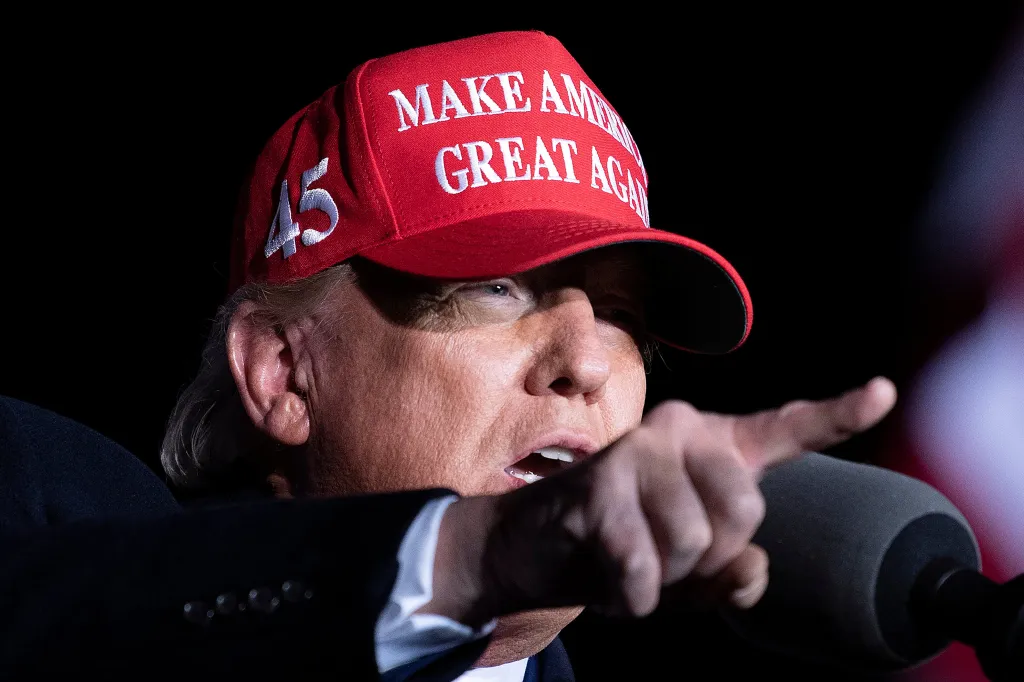The Nostalgia Vote: Why Politicians are Selling a Return to an Idealized Past

From MAGA to Putin’s Russia, here’s how leaders weaponize nostalgia to seize power.
Nostalgia is a powerful emotion, isn’t it.
A bittersweet longing for a time when life seemed simpler, more certain, and, most importantly (and vaguely) better. It’s the mental tug of familiarity that draws people back to a time when the world appeared more stable, secure, and comprehensible.
And in contemporary politics, nostalgia has found new life as a strategic tool—particularly among populist and nationalist leaders—aimed at voters disillusioned with the present and scared of the future.
Voters who, statistically, might look an awful lot like your boyfriend. Your parents.
It’s a growing and worrying movement. Recent studies reveal that around two-thirds of the European public feel nostalgic about their nation’s past. Take that alongside the move to the right among Euro voters, and you can see the power of a widespread sense of loss. It provides fertile ground for political demagogues and fire breathers who promise a return to an imagined golden age, presenting themselves as the architects of a return to “the good old days.”
The Appeal of Nostalgia in Politics
Nostalgia’s allure in politics lies in its capacity to connect with voters on an emotional level, influencing their views and choices at the ballot box. Research suggests that nostalgic citizens tend to be more dissatisfied with their government and are likelier to support radical right-wing parties.
Their dissatisfaction stems from a perception that societal changes—cultural shifts, economic upheavals, or demographic transformations—have eroded what once made their country “great” - whatever that means. In this way, nostalgia becomes a lens through which present grievances are projected onto an idealized past, whether or not it has any fucking bearing on reality itself.
Nationalist parties, particularly in central and eastern Europe, are adept at invoking a glorious historical narrative. Italy’s far-right Fratelli d’Italia party made extensive use of nostalgic references to the nation’s heritage in its 2022 manifesto.
The messaging resonates deeply with voters who feel disconnected from a rapidly changing society, offering them a comforting narrative that promises to restore what has been lost. The appeal is not strictly economic - it’s profoundly cultural, tied to notions of identity, tradition, and heritage.
Nostalgia as a Political Strategy
We’re not talking here about an innocent byproduct of societal discontent—nostalgia movements are a deliberate strategy employed by politicians, particularly when addressing cultural issues rather than economic concerns. When faced with hard-to-solve problems like immigration, globalization, or social diversity, nostalgic rhetoric becomes a convenient distraction, providing simple, emotionally charged narratives that resonate more deeply than policy details ever could. Instead of offering detailed economic reforms, politicians emphasize a return to a time when jobs were more secure, communities were more homogenous, and traditional values were undisputed. Even if that better time never actually existed.
Nostalgic appeals are also strategically designed to capture swing voters who may feel alienated by both mainstream parties and progressive agendas. Spencer Goidel, a political analyst, has noted that “nostalgic appeals could attract those more independent-minded swing voters to the Republican Party” in the 2024 U.S. elections. It’s almost terrifying how easily nostalgia can tip the balance in closely contested races, especially in regions where economic distress and cultural anxiety intersect. According to Goidel and his colleagues, Kirby Goidel and Paul Kellstedt, independents with high levels of nostalgia had a 74% probability of voting Republican and only a 25% probability of voting Democratic. In contrast, independents with low levels of nostalgia had a 57% probability of voting Democratic and a 40% probability of voting Republican.
The Dangers of Restorative Nostalgia
Some forms of nostalgia can build a positive connection to cultural heritage. I’m not here to shit all over that. But “restorative nostalgia” is a dangerous concept. Restorative nostalgia focuses on the idea of returning to a hallowed past, often attributing its loss to external threats or internal betrayals. This type of nostalgia is the backbone of many modern national and religious revival movements, creating fertile ground for scapegoating and exclusionary policies .
Restorative nostalgia trends to the “us versus them” mentality. Donald Trump’s rhetoric, which (despite coming from the son of immigrant parents) pined for a time before the influx of immigrants and societal changes, promised to “Make America Great Again.”
This framing not only romanticizes the past but also suggests that there are specific groups responsible for its decline, leading to social divisions and resentment. As Gregory Rodriguez points out, such nostalgia can become a “recipe for resentment, and potentially, revenge.”
Trump is not a trailblazer. He’s following the same playbook as almost every other chest thumping, rose-glass wearing strong-man. Russian President Vladimir Putin’s vision of a resurgent Russia, inspired by Soviet-era strength, has driven his confrontational stance toward the West. In China, state-sponsored nostalgia for the era of imperial greatness serves as a counter-narrative to Western influence. Xi Jinping’s current rhetoric of a “China Dream of Great Rejuvenation” uses a reinvented history, linking China’s progress as a global power with a selective re-reading of its millennial history. Nostalgia for China’s past and its five-thousand-year-old civilization is a key feature of the China Dream narrative.
Nostalgia and the Rise of Populism
Populism and nostalgia are intimately connected. Populist leaders thrive on a narrative that posits a glorious past, positioning themselves as the only ones capable of restoring this lost era. They build their appeal around an imaginary heartland—a time and place where the nation was morally pure and uncorrupted by contemporary complexities. This narrative creates a clear demarcation between the “real people” and those who are painted as responsible for the nation’s decline, including political elites, immigrants, the LGBT+ community, Jews and international institutions.
In Turkey, research by Ezgi Elçi found that Islamist nostalgia for the Ottoman Empire has been effective in bolstering populist attitudes . This nostalgia not only emphasizes Turkey’s historical role as a global power but also frames contemporary issues like Westernization and secularism as deviations from a once-great civilization. Similar dynamics are visible in other countries where populist leaders invoke a culturally cohesive and politically sovereign past.
In the U.S., nostalgia has served as a catalyst for polarization. Competing visions of the past, such as Donald Trump’s longing for postwar American prosperity versus Bernie Sanders’ vision of a New Deal-inspired era of social welfare, have amplified divides within the electorate. These competing nostalgias reflect deeper cultural and economic anxieties, driving voters to choose sides based on which version of history resonates with their sense of loss or aspiration.
Nostalgia is a potent force in modern politics. It can connect individuals to a sense of shared history and identity, offering comfort amid the uncertainties of contemporary life. But far more often, it’s a tool for division, setting up simplified narratives that vilify those who are seen as obstacles to a return to greatness.
Nostalgia itself is not inherently harmful.
I listen to far too much early 2000’s emo to make that ludicrous fucking argument.
But as voters we have to remain skeptical of politicians who rely heavily on nostalgic rhetoric.
Behind the comforting images of a better past, there is a lack of any concrete plan for the future. As Ezgi Elçi notes, nostalgia can also be channeled in a positive direction, the yearning for a liberal, democratic past that inspires greater civic engagement. But the rise (and rise, and rise) of restorative nostalgia globally tells us these appeals are used to justify exclusionary policies and entrench political divides.
When political discourse is increasingly shaped by emotional appeals instead of any kind of logical or rational decision making, understanding the mechanics of nostalgia in politics is mission critical. We have to individually remember the past to recognize how collective memories of it are reshaped, weaponized, and deployed to serve specific political ends.
As the world navigates a shitstorm of uncertainty and change, the nostalgia vote will likely continue to be a defining factor in elections.
But whether it leads to a more inclusive vision of society or a regressive retreat into selective memory, self-justified violence and ignorant darkness remains to be seen.

Discussion